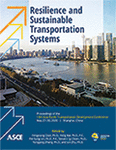13th Asia Pacific Transportation Development Conference
Implication of Eco-Driving at a Single Lane Roundabout
Publication: Resilience and Sustainable Transportation Systems
ABSTRACT
Eco-driving applications in the context of signalized intersections have been extensively discussed in previous studies. However, very few of them examined the impacts of eco-driving on the operations and especially, on emission characteristics in a roundabout. This paper attempts to explore the eco-driving impacts on vehicle emissions generated in the situation of a single-lane roundabout through a driving simulator-based test. Twenty subjects were recruited to drive through the roundabout with the aid of an in-vehicle advance voice warning system, which provides advance voice warning messages on an approaching roundabout at different locations, from 150 m to 50 m distance to the stop line of the roundabout. Results showed that, the carbon dioxide emissions in the scenario with an earlier warning message in 150 m trigger distance are less than the one with latter warning message in 50 m trigger distance. Compared with baseline scenarios without warning messages, an early warning message could induce the less emissions in most scenario groups. It is concluded that, under certain circumstances, vehicle emissions can be reduced if the drivers start to decelerate at an approaching distance of 150 m to a roundabout.
Get full access to this article
View all available purchase options and get full access to this chapter.
REFERENCES
Du, J., Qiao, F. & Yu, L. 2019. Temporal characteristics and forecasting of PM2.5 concentration based on historical data in Houston, USA. Resources, Conservation and Recycling, 147, 145-156.
EPA 2014. Global Emissions. https://www.epa.gov/ghgemissions/global-greenhouse-gas-emissions-data. Accessed July, 2017.
FHWA 2000. Roundabout: An Informational Guide. https://www.fhwa.dot.gov/publications/research/safety/00067/00067.pdf. Accessed in July, 2017.
Frey, H., Unal, A., Chen, J., Li, S. & Xuan, C. 2002. Methodology for developing modal emission rates for EPA’s multi-scale motor vehicle & equipment emission system. Ann Arbor, Michigan: US Environmental Protection Agency.
Jiang, H., Hu, J., An, S., Wang, M. & Park, B. B. 2017. Eco approaching at an isolated signalized intersection under partially connected and automated vehicles environment. Transportation Research Part C: Emerging Technologies, 79, 290-307.
Kite, C. 2011. Preliminary comparison between MOVES and MOBILE6 Houston/Galveston/Brazoria (HGB) on-road emission inventories for 2006 and 2018. Texas Commision on Environmental Quality, Austin, Texas.
Li, Q., Qiao, F. & Yu, L. 2016. Implications of advanced warning messages on eliminating sun glare disturbances at signalized intersections. Journal of Traffic and Transportation Engineering (English Edition), 3, 296-307.
Mandava, S., Boriboonsomsin, K. & Barth, M. Arterial velocity planning based on traffic signal information under light traffic conditions. 2009 12th International IEEE Conference on Intelligent Transportation Systems, 2009. IEEE, 1-6.
Salamati, K., Coelho, M. C., Fernandes, P. J., Rouphail, N. M., Frey, H. C. & Bandeira, J. 2013. Emissions estimation at multilane roundabouts: effects of movement and approach lane. Transportation Research Record, 2389, 12-21.
Staubach, M., Schebitz, N., Köster, F. & Kuck, D. 2014. Evaluation of an eco-driving support system. Transportation research part F: traffic psychology and behaviour, 27, 11-21.
Stevanovic, A., Stevanovic, J., Zhang, K. & Batterman, S. 2009. Optimizing traffic control to reduce fuel consumption and vehicular emissions: Integrated approach with VISSIM, CMEM, and VISGAOST. Transportation Research Record, 2128, 105-113.
Sun, X., Chen, X., Qi, Y., Mao, B., Yu, L. & Tang, P. 2016. Analyzing the effects of different advanced traffic signal status warning systems on vehicle emission reductions at signalized intersections.
Zhao, X., Wu, Y., Rong, J. & Zhang, Y. 2015. Development of a driving simulator based eco-driving support system. Transportation Research Part C: Emerging Technologies, 58, 631-641.
Information & Authors
Information
Published In
Resilience and Sustainable Transportation Systems
Pages: 705 - 714
Editors: Fengxiang Qiao, Ph.D., Texas Southern University, Yong Bai, Ph.D., Marquette University, Pei-Sung Lin, Ph.D., University of South Florida, Steven I Jy Chien, Ph.D., New Jersey Institute of Technology, Yongping Zhang, Ph.D., California State Polytechnic University, and Lin Zhu, Ph.D., Shanghai University of Engineering Science
ISBN (Online): 978-0-7844-8290-2
Copyright
© 2020 American Society of Civil Engineers.
History
Published online: Jun 29, 2020
Published in print: Jun 29, 2020
Authors
Metrics & Citations
Metrics
Citations
Download citation
If you have the appropriate software installed, you can download article citation data to the citation manager of your choice. Simply select your manager software from the list below and click Download.
